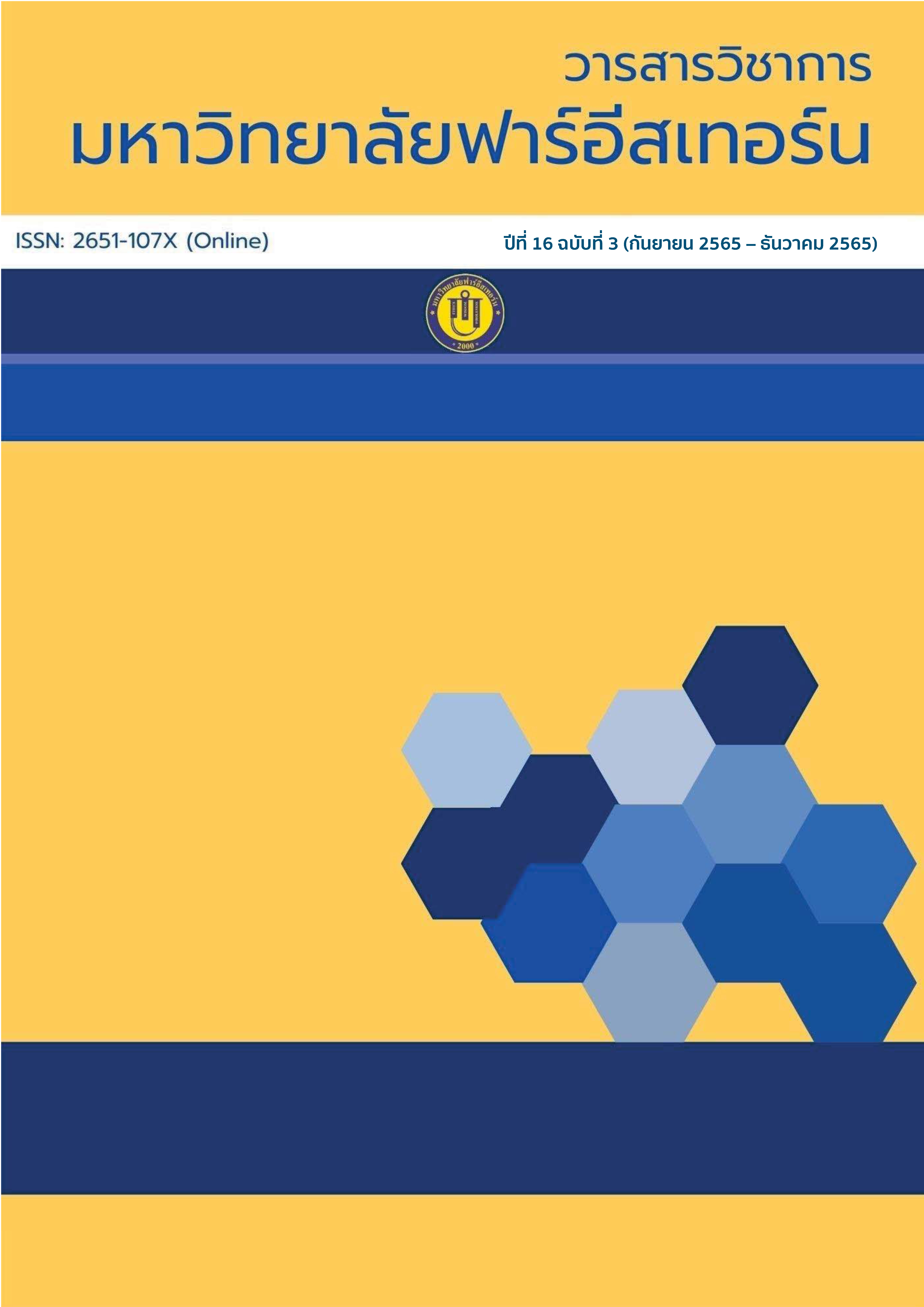Development of Enrichment Curriculum to Enhance Entrepreneurship by Integrating STEM Education with Canvas Business Model for Grade 7 Gifted Science Students at The Prince Royal’s College
Main Article Content
Abstract
The purposes of this research were to develop and study the result of use enrichment curriculum to enhance entrepreneurship by integrating STEM Education with Canvas Business Model for grade 7th gifted science students at The Prince Royal’s College. The population in this research are 5 curriculum and instruction experts and 44 gifted science students of grade 7th of 2nd semester in academic year 2021 of The Prince Royal’s College. Selecting sample by specific. This research is quantitative research. The research instruments were curriculum quality assessment form, business plan writing ability assessment form, and pitching ability assessment form. Data were analyzed by means, percentage, and standard deviation. The results of this research were as follow: 1) Enrichment curriculum to enhance entrepreneurship by integrating STEM Education with Canvas Business Model for grade 7th gifted science students at The Prince Royal’s College consist of 9 components in total: (1) Curriculum Principles (2) Curriculum Objectives (3) Course Description (4) Curriculum Structure (5) Learning Activities (6) Media and Learning Resources (7) Teacher Roles (8) Learners Roles and (9) Measurement and Evaluation. Overall, the quality of the curriculum was at the highest level. 2) The results of use enrichment curriculum to enhance entrepreneurship by integrating STEM Education with Canvas Business Model for grade 7th gifted science students at The Prince Royal’s College were a very good level of business plan writing and pitching ability.
Article Details

This work is licensed under a Creative Commons Attribution-NonCommercial-NoDerivatives 4.0 International License.
1. Any views and comments in the Journal of Social Innovation and Lifelong Learning are the authors’ views. The editorial staff have not to agree with those views and it is not considered as the editorial’s responsibility.
2. The responsibility of content and draft check of each article belongs to each author. In case, there is any lawsuit about copyright infringement. It is considered as the authors’ sole responsibility.
3. The article copyright belonging to the authors and The Far Eastern University are copyrighted legally. Republication must be received direct permission from the authors and The Far Eastern University in written form.
References
กระทรวงศึกษาธิการ. (2551). หลักสูตรแกนกลางการศึกษาขั้นพื้นฐานพุทธศักราช 2551. ชุมนุมสหกรณ์การเกษตรแห่งประเทศไทย. http://academic.obec.go.th/images/document/1559878925_d_1.pdf
กฤตนัน วิโรจน์สายลี. (2562, 12 มีนาคม). บทที่ 49 : หลักพื้นฐานของการ Pitching. Sales101thailand. https://sales101thailand.com/basic-principles-of-pitching/
กัลยารัตน์ ธีระธนชัยกุล. (2562). การเป็นผู้ประกอบการและการสร้างธุรกิจใหม่. ซีเอ็ดยูเคชั่น.
จิราภา วิทยาภิรักษ์. (2562, 26 สิงหาคม). “Pitch” สกิลใหม่ที่นักนำเสนอมืออาชีพต้องมี. กรุงเทพธุรกิจ. https://www.bangkokbiznews.com/pr-news/biz2u/265561
เฉลียวศรี พิบูลชล, อรุณี วิริยะจิตรา, และ อุษณีย์ อนุรุทธ์วงศ์. (2554). การพัฒนามาตรฐานการศึกษาสำหรับผู้มีความสามารถพิเศษ. ออฟเซ็ท. http://backoffice.onec.go.th/uploads/Book/1093-file.pdf
ชัยวัฒน์ สุทธิรัตน์. (2564). การพัฒนาหลักสูตร ทฤษฎีสู่การปฏิบัติ (พิมพ์ครั้งที่ 8 ฉบับปรับปรุง). เอ็มดี ออล กราฟิก.
ตลาดหลักทรัพย์แห่งประเทศไทย. (2563). Business Model Canvas. https://www.set.or.th/set/enterprise/html.do?name=bmc
ทัสริน โตนุช. (2561). การพัฒนาหลักสูตรเสริม เรื่อง วิทยาศาสตร์สุขภาพกับความงามและการชะลอวัยเพื่อส่งเสริมความสามารถในการคิดแก้ปัญหาและความคิดสร้างสรรค์สำหรับนักเรียนระดับมัธยมศึกษาตอนต้น โรงเรียนสาธิตในเขตกรุงเทพมหานคร [วิทยานิพนธ์ปริญญาดุษฎีบัณฑิต, มหาวิทยาลัยธุรกิจบัณฑิตย์]. http://libdoc.dpu.ac.th/thesis/Tassarin.Ton.pdf
ธงชัย สุทธิสม. (2560). การเป็นผู้ประกอบการ. ส.ส.ท.
นงลักษณ์ แพงเรือน. (2558). การพัฒนาหลักสูตรเสริมสร้างความสามารถในการพูดภาษาอังกฤษเพื่อให้ข้อมูลตามแนวคิดฐานสมรรถนะ สำหรับผู้เรียนระดับมัธยมศึกษาตอนปลาย [วิทยานิพนธ์ปริญญาดุษฎีบัณฑิต, จุฬาลงกรณ์มหาวิทยาลัย]. http://cuir.car.chula.ac.th/handle/123456789/50683
พันทิวา กุมภิโร. (2560). การพัฒนาหลักสูตรเสริมตามแนวคิดการเรียนรู้แบบอิงบริบท โดยใช้ปัญหาเป็นฐานเพื่อเสริมสร้างทักษะและกระบวนการทางคณิตศาสตร์ สำหรับนักเรียนระดับชั้นประถมศึกษาปีที่ 6 [วิทยานิพนธ์ปริญญาดุษฎีบัณฑิต, มหาวิทยาลัยราชภัฏสกลนคร]. SNRU e-Thesis. https://gsmis.snru.ac.th/e-thesis/thesis_detail?r=55632227104
ภรณี ศิริวิศาลสุวรรณ. (2562). การพัฒนาหลักสูตรเสริมสร้างทักษะชีวิตในยุคดิจิทัลสำหรับนักเรียนระดับชั้นมัธยมศึกษาตอนต้นของโรงเรียนสังกัดกรุงเทพมหานคร [วิทยานิพนธ์ปริญญาดุษฎีบัณฑิต, มหาวิทยาลัยศิลปากร]. http://ithesis-ir.su.ac.th/dspace/bitstream/123456789/2666/1/58253904.pdf
โรงเรียนปรินส์รอยแยลส์วิทยาลัย. (2563). รายงานการประเมินตนเองของสถานศึกษา (Self – Assessment Report : SAR) ปีการศึกษา 2563. https://a069c3b0-7366-4d77-885b-6e23d6b16151.filesusr.com/ugd/83f488_e0eb36df33e64eeebec9d7cd8b08688a.pdf
วศิณีส์ อิศรเสนา ณ อยุธยา. (2559). เรื่องน่ารู้เกี่ยวกับ STEM Education (สะเต็มศึกษา). สำนักพิมพ์แห่งจุฬาลงกรณ์มหาวิทยาลัย.
วิชัย วงษ์ใหญ่. (2554). การพัฒนาหลักสูตรระดับอุดมศึกษา. อาร์ แอนด์ ปริ้น.
สถาบันส่งเสริมการสอนวิทยาศาสตร์และเทคโนโลยี. (2561). STEM Education Thailand สะเต็มศึกษา ประเทศไทย. Stemedthailand. http://www.stemedthailand.org/?page_id=23
สมเกียรติ อินทสิงห์. (2563). การบริหารหลักสูตรสถานศึกษา. หน่วยพิมพ์เอกสารคณะวิทยาศาสตร์ มหาวิทยาลัยเชียงใหม่.
สำนักงานคณะกรรมการพัฒนาการเศรษฐกิจและสังคมแห่งชาติ. (2562). ยุทธศาสตร์ชาติ 20 ปี (พ.ศ. 2561-2580). สำนักงานเลขานุการของคณะกรรมการยุทธศาสตร์ชาติ สำนักงานคณะกรรมการพัฒนาการเศรษฐกิจและสังคมแห่งชาติ. http://nscr.nesdb.go.th/wp-content/uploads/2019/09/Rev-05-ยุทธศาสตร์ชาติ.docx
สำนักงานบริหารและพัฒนาองค์ความรู้. (2561). THE KNOWLEDGE. โคคูน แอนด์ โค.
สำนักงานเลขาธิการสภาการศึกษา. (2562). การศึกษาสภาพและรูปแบบการจัดการศึกษาสำหรับกลุ่มผู้ที่มีความต้องการจำเป็นพิเศษที่เหมาะสมกับบริบทของประเทศไทย: กรณีผู้มีความสามารถพิเศษ. พริกหวานกราฟฟิค. http://backoffice.onec.go.th/uploads/Book/1711-file.pdf
สำนักงานส่งเสริมวิสาหกิจขนาดกลางและขนาดย่อม. (2563). Business Model Canvas เครื่องมือสร้างโมเดลธุรกิจ. https://www.smeknowledgecenter.com/slides/slide/business-model-canvas-213
สิริพงศ์ จึงถาวรรณ. (2561). LEAN ผู้ประกอบการยุคใหม่ จากก้าวเล็กๆ สู่ก้าวที่ยิ่งใหญ่ในโลกธุรกิจ. 7D ACADEMY.
สุเทพ อ่วมเจริญ. (2557). การพัฒนาหลักสูตร: ทฤษฎีและการปฏิบัติ. โรงพิมพ์มหาวิทยาลัยศิลปากร.
สุนีย์ ภู่พันธ์. (2546). แนวคิดพื้นฐานการสร้างและพัฒนาหลักสูตร. เชียงใหม่โรงพิมพ์แสงศิลป์.
สุพัชรา ดิษฐบรรจง. (2562). ความสำคัญของผู้ประกอบการเยาวชนและการเตรียมความพร้อมของเขตเศรษฐกิจพิเศษนครพนม. Itd. https://www.itd.or.th/wp- content/uploads/2019/06/unnamed-file1.pdf
Carpineanu, S. (2021, March 4). How to Create a Successful Business Pitch. Visme. https://visme.co/blog/business-pitch
Dalton, W. (2020, August 25). What is STEM? Pearson. https://pearsonaccelerated.com/blog/stem
Hom, E. J. & Dobrijevic, D. (2022, February 17). What is STEM Education? Livescience. https://www.livescience.com/43296-what-is-stem-education.html
Lima, M. & Baudier, P. (2017). Business Model Canvas Acceptance among French Entrepreneurship Students: Principles for Enhancing Innovation Artefacts in Business Education. Journal of Innovation Economics & Management, 23(2), 159. https://doi.org/10.3917/jie.pr1.0008
Osterwalder, A. & Pigneur, Y. (2010). Business model generation: A handbook for visionaries, game changers, and challengers. Bridge Communications.
Redko, O. & Moskalenko, O. (2021). Psychological Strategies in the Process of Pitching New Business Opportunities. Education of Economists and Managers, 59(1), 21–30. https://econjournals.sgh.waw.pl/EEiM/article/download/2718/2415
Renzulli, J. S. (1976). The enrichment triad model. A guide for developing defensible programs for the gifted and talented. Gifted Child Quarterly, 20(3), 303–326. https://doi.org/10.1177/001698627602000327
Saylor, J. G. & Alexander, W. M. (1974). Planning Curriculum for Schools. Rinehart and Winston.
Taba, H. (1962). Curriculum Development: Theory and Practice. Harcourt, Brace and World.
Tyler, R. W. (1949). Basic principles of curriculum and instruction. The University of Chicago Press.
Ulger, B. B. & Cepni, S. (2020). Gifted education and STEM: A Thematic Review. Journal of Turkish Science Education, 17(3), 443-466. https://files.eric.ed.gov/fulltext/EJ1272816.pdf

